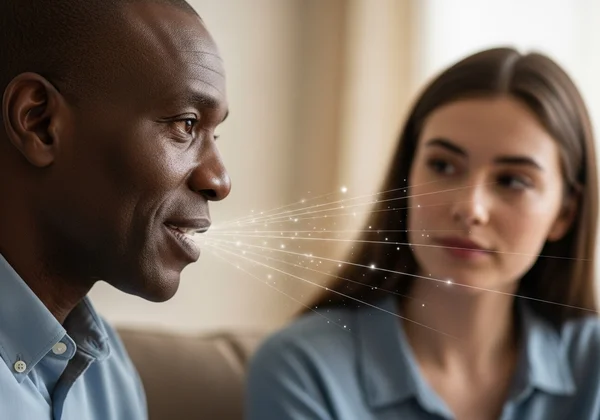긍정의 말: 이 사랑의 언어를 진정으로 구사하는 방법
July 6, 2025 | By Hannah Carter
파트너에게 하는 칭찬이 제대로 와닿지 않거나, 마치 다른 언어로 말하는 것처럼 느껴진 적이 있으신가요? 긍정의 말 을 이해하는 것은 더 깊은 관계를 맺는 데 있어 관계에 큰 변화를 가져올 수 있습니다. 이것은 사람들이 주로 사랑을 표현하고 받는 다섯 가지 방식 중 하나이며, 게리 채프먼 박사가 대중화한 이론입니다. 하지만 나의 사랑의 언어는 무엇이며, 이 하나를 제대로 익히는 것이 어떻게 관계를 변화시킬 수 있을까요?
긍정의 말이라는 미묘한 기술을 이해하면 상대방이 진정으로 인정받고, 가치 있다고 느끼며, 사랑받는다고 느끼게 만들 수 있습니다. 이 심층적인 탐구는 이 강력한 사랑의 언어를 주고받는 방법을 탐구하여, 더욱 강하고 의미 있는 유대감을 형성하도록 도울 것입니다. 이 사랑의 언어와 다른 사랑의 언어에 대해 더 자세히 알고 싶다면, 저희의 빠르고 통찰력 있는 무료 사랑의 언어 테스트를 통해 자신만의 고유한 프로필을 발견해 보세요.

긍정의 말 이란 무엇이며 왜 중요할까요?
핵심적으로 긍정의 말 은 사랑, 감사, 격려를 전달하기 위해 말이나 글로 표현하는 것을 포함합니다. 이것은 단순한 "잘했어"나 예의 바른 "고마워" 그 이상입니다. 긍정의 말 을 주로 사용하는 사람들에게 있어 진심 어린 칭찬, 성실한 감사, 말로 표현되는 지지는 정서적인 연료와 같습니다. 이러한 말은 그들의 가치를 인정하고, 노력에 감사하며, 진정으로 소중히 여겨진다고 느끼게 합니다.
긍정의 말 의 본질
긍정의 말 의 핵심 의미는 상대방에게 힘을 주는, 격려하며, 인정하는 능력에 있습니다. 이러한 형태의 정서적 연결 은 다른 사람의 긍정적인 자질, 성취 및 노력을 인식하고 표현하는 것을 포함합니다. 이는 당신이 상대에게 주의를 기울이고 있으며, 그들의 존재를 소중히 여기고, 그들의 행동이 당신에게 중요하다는 것을 보여줍니다. 이는 모든 관계에서 사랑을 표현하고 성장을 키우는 강력한 방법이며, 상호 이해 와 깊은 존중 을 증진합니다.

칭찬 그 이상: 의도와 영향 이해하기
칭찬이 구성 요소이기는 하지만, 긍정의 말 은 피상적인 칭찬을 훨씬 뛰어넘습니다. 진정한 힘은 당신의 말의 진정한 진정성 과 구체적인 영향 에 있습니다. 예를 들어, 일반적인 "보기 좋다" 대신 긍정적인 말은 "오늘 당신의 옷차림이 정말 멋지네요. 우리 데이트를 신경 써준 것 같아."와 같을 수 있습니다. 이는 관찰과 더 깊은 수준의 감사 를 보여줍니다. 이는 노력을 인정하고 메시지를 개인화하여 받는 사람에게 더 깊고 지속적인 긍정적인 영향을 줍니다. 이처럼 구체적이고 진심 어린 표현은 신뢰를 쌓고 진정으로 사랑받고 있다는 느낌을 강화합니다.
긍정의 말 을 효과적으로 구사하는 방법
긍정의 말 을 효과적으로 구사하는 방법은 당신의 의사소통에 의도적이고 사려 깊은 태도를 포함하는 것입니다. 이는 상대방에게 맞춰 말하고, 그 말이 깊이 공감하고 진정한 감정을 전달하도록 보장하는 것을 의미합니다. 이러한 사려 깊은 연습은 당신과 사랑하는 사람들 사이의 더 강한 친밀감과 깊은 이해를 증진합니다.
긍정의 말 의 구체적인 예시
진정한 긍정의 말 예시를 제공하기 위해, 당신이 감사하는 특정 자질이나 행동에 대해 생각해 보세요. 사용할 수 있는 사랑의 말 에 대한 몇 가지 아이디어는 다음과 같습니다.
- 노력 및 성과에 대하여: "이 프로젝트에 대한 당신의 헌신에 정말 감명받았습니다." 또는 "당신은 그 도전을 믿을 수 없을 만큼 능숙하게 처리했습니다."
- 성격 및 존재 자체에 대하여: "나는 당신의 친절함과 항상 다른 사람을 먼저 생각하는 당신의 모습에 감탄합니다." 또는 "당신의 유머 감각은 항상 제 하루를 밝게 만들어 줍니다."
- 지지 및 존재 자체에 대하여: "판단 없이 제 이야기를 들어줘서 고마워요. 정말 큰 의미가 있어요." 또는 "당신과 함께 있을 때면 저는 아주 안전하고 사랑받는다고 느껴요."
- 신체적인 외모에 대하여: "오늘 밤 정말 아름답네요. 그 색깔이 당신의 눈을 더욱 돋보이게 해요." (구체적이고 진실하게 하세요.)
- 격려에 대하여: "당신이 해낼 수 있다는 것을 알아요. 나는 당신을 완전히 믿어요." 또는 "포기하지 마세요. 당신의 인내는 영감을 줍니다."
이러한 구체적인 예시는 당신이 진정으로 상대방을 알아차리고 소중히 여기고 있음을 보여주며, 훨씬 더 영향력 있는 사랑의 표현으로 이어집니다.
진정성과 타이밍을 맞춰 긍정의 말 전달하기
긍정의 말 의 힘은 바로 진정성 에서 나옵니다. 진정성 없거나 일반적인 문구는 공허하게 느껴질 수 있습니다. 다음을 통해 진실한 말인지 확인하세요.
- 진심으로 하기: 진정으로 느끼는 것만 말하세요.
- 구체적으로 하기: "멋지다" 대신 "우리 여행을 위해 모든 것을 준비해주어서 정말 좋았어. 덕분에 편안하게 여행할 수 있었어."라고 말해보세요.
- 적절한 시기 선택하기: 때로는 조용하고 친밀한 순간이 깊은 감사를 표현하기에 가장 좋습니다. 다른 때에는 공개적인 인정이 매우 긍정적일 수 있습니다.
- "나" 진술 사용하기: "당신은 정말 참을성이 많아"보다는 "당신의 인내심에 정말 감사하게 느껴"가 더 영향력이 있습니다. 이는 자신의 진솔한 감정에 초점을 맞추는 것입니다.
기억하세요, 목표는 상대방이 진정으로 인정받고 소중히 여겨진다고 느끼게 하는 것이며, 이는 당신의 관계의 조화 와 연결을 향상시킵니다.

긍정의 말 을 할 때 피해야 할 일반적인 함정
긍정의 말 을 하는 것은 간단해 보이지만, 그 영향을 줄이거나 심지어 상처를 줄 수도 있는 일반적인 실수가 있습니다.
- 진심이 담기지 않은 말: 억지스럽거나 사실이 아닌 말은 쉽게 감지되며 불신으로 이어질 수 있습니다.
- 모호함: "착하다"와 같은 일반적인 칭찬은 긍정의 말 을 의미있게 만드는 구체성이 부족합니다.
- 과도함: 지속적이거나 과도한 칭찬은 그 영향력을 잃고 공허하게 들릴 수 있습니다. 양보다 질이 중요합니다.
- 조건부 칭찬: "네가 X를 할 때 사랑해"라고 말하는 것은 상대방이 자신의 가치가 조건적이라고 느끼게 할 수 있으며, 이는 긍정의 말 과는 반대입니다.
- 조작을 위한 긍정의 말 사용: 원하는 것을 하도록 상대방을 설득하기 위해 긍정의 말 을 사용하지 마세요. 이는 신뢰성 을 침식하고 관계를 손상시킵니다.
- 성과에만 초점 맞추기: 성취한 것뿐만 아니라 성격, 노력, 그리고 존재 자체를 긍정하는 것을 기억하세요.
긍정의 말 받기 및 응답하기
당신이 사랑을 어떻게 받는지 아는 것은 그것을 표현하는 방법을 배우는 것만큼이나 중요합니다. 긍정의 말 이 당신의 주된 사랑의 언어라면, 이 필요를 인식하는 것은 당신의 관계 내에서 깊은 개인적인 성장과 개선된 의사소통으로 이어질 수 있습니다. 종종 간단한 정서적 연결 테스트 또는 자기 성찰을 통해 이를 식별할 수 있습니다.
긍정의 말 에 대한 당신의 필요성 파악하기
누군가 당신의 특정 자질을 감사한다고 말할 때 당신은 기뻐하나요? 진심 어린 메모나 문자가 물리적인 선물이나 호의보다 당신에게 더 큰 의미가 있나요? 비판이나 거친 말에 깊이 상처받나요? 그렇다면, 긍정의 말 이 당신의 주된 사랑의 언어일 수 있습니다.
이를 이해하면 사랑의 말로 인해 감정 탱크가 가득 찼을 때와 부족할 때를 인식할 수 있게 됩니다. 당신 자신의 자기 성찰 패턴을 인식하는 것이 중요합니다. 확실하지 않거나 정확한 답을 원한다면, 구조화된 평가를 받는 것이 도움이 될 수 있습니다. 저희 웹사이트에서 무료 사랑의 언어 테스트를 통해 당신의 주된 사랑의 언어를 확인할 수 있습니다.

긍정의 말 에 대한 당신의 필요성 전달하기
긍정의 말 에 대한 당신의 필요성을 파악한 후, 다음 단계는 그것을 파트너, 가족 또는 친구에게 친절하고 명확하게 전달하는 것입니다. 당신의 필요를 알지 못하면 채워줄 수 없습니다!
- 구체적으로 하기: "더 많은 칭찬이 필요해" 대신 "내 요리에 대해 감사하다고 말해줄 때 정말 사랑받는다고 느껴져"라고 말해보세요.
- "나" 진술 사용하기: "당신은 절대 내가 잘한다고 말해주지 않아" 대신 "직장에서의 내 노력을 인정해 줄 때 정말 감사하게 느껴져"라고 말하세요.
- 부드럽게 교육하기: 당신은 이 기사와 같은 글을 공유하거나 사랑하는 사람들에게 5가지 사랑의 언어에 대해 더 배우도록 격려할 수 있습니다.
- 감사 표현하기: 누군가 긍정의 말 을 할 때, 그것을 긍정적으로 인정하세요. "고마워요, 정말 큰 의미가 있었어요"는 그 행동을 강화합니다. 이러한 상호 이해는 파트너십 을 강화합니다.
긍정의 말 로 관계에 힘을 실어주세요
긍정의 말 은 분명 강력한 힘을 지니고 있습니다. 그것은 당신의 삶의 모든 관계, 로맨틱한 파트너십에서부터 우정, 가족 유대까지 구축하고, 격려하고, 치유하고, 깊게 만들 수 있는 능력을 가지고 있습니다. 의식적으로 이 사랑의 언어를 말하고 받는 것을 선택함으로써, 당신은 정서적 연결을 강화하고 상호 존중과 감사 의 환경을 조성하는 긍정적인 피드백 루프를 만듭니다.
당신과 당신의 사랑하는 사람들이 독특하게 사랑을 경험하는 방식을 이해함으로써 관계를 변화시킬 준비가 되셨나요? 오늘 당신의 주된 사랑의 언어를 발견하세요! 저희의 무료, 빠르고 통찰력 있는 온라인 테스트를 통해 당신의 사랑의 언어를 찾으세요.
자주 묻는 질문
나의 사랑의 언어를 어떻게 찾나요?
당신의 사랑의 언어를 찾는 가장 좋은 방법은 게리 채프먼 박사의 이론에 기반한 포괄적인 평가를 받는 것입니다. 저희 웹사이트는 일련의 사려 깊은 질문을 통해 당신의 주된 사랑의 언어와 부차적인 사랑의 언어를 식별하는 데 도움이 되는 무료 사랑의 언어 테스트를 제공합니다. 빠르고 통찰력 있으며 여정을 시작하는 것은 완전히 무료입니다.
사랑의 언어가 변할 수 있나요?
당신의 주된 사랑의 언어는 종종 인생 동안 일관되게 유지되지만, 중요한 삶의 변화, 개인적인 성장 또는 관계 역학의 변화로 인해 시간이 지남에 따라 미묘하게 변할 수 있습니다. 정확성을 보장하기 위해 주기적으로 당신의 사랑의 언어를 재평가하는 것이 좋습니다.
누군가의 사랑의 언어가 긍정의 말 인지 어떻게 알 수 있나요?
긍정의 말 이 사랑의 언어인 사람들은 종종 구두 칭찬, 칭찬, 진심 어린 감사 표현을 높이 평가합니다. 그들은 또한 다른 사람들에게 이러한 것들을 빠르게 제공할 수 있으며, 비판이나 거친 말에 특히 상처받을 수 있습니다. 그들이 무엇을 필요로 하는지 또는 무엇이 그들을 가장 북돋아주는지에 주의를 기울이세요.
사랑의 말의 예시는 무엇인가요?
사랑의 말 에는 "정말 고마워요", "정말 잘했어요", "나는 당신을 믿어요", "당신 덕분에 정말 행복해요", "항상 거기 있어줘서 고마워요" 또는 "당신의 강인함에 감탄해요"와 같은 문구가 포함될 수 있습니다. 핵심은 구체적이고 진실하며 진심 어린 것입니다.
긍정의 말 은 항상 말로 해야 하나요?
아니요, 긍정의 말 은 항상 말로 해야 하는 것은 아닙니다. 말로 하는 말은 중요하지만, 서면 긍정 (진심 어린 편지, 사려 깊은 문자 메시지 또는 격려의 말이 담긴 메모와 같은) 또한 일부 사람들에게는 똑같이, 아니면 더 큰 영향을 줄 수 있습니다. 매체는 전달되는 진심 어린 메시지보다 덜 중요합니다. 커플을 위한 사랑의 언어 퀴즈를 통해 당신과 당신의 파트너가 서로를 더 잘 이해하고 오늘 당신의 결과를 발견해 보세요!